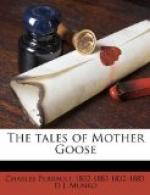“Ah!” cried out his wife, “could you really take the children and lose them?”
In vain did her husband represent to her their great poverty; she would not consent to it. She was poor, but she was their mother.
However, having considered what a grief it would be to her to see them die of hunger, she consented, and went weeping to bed.
Little Thumb heard all they had said; for, hearing that they were talking business, he got up softly and slipped under his father’s seat, so as to hear without being seen. He went to bed again, but did not sleep a wink all the rest of the night, thinking of what he had to do. He got up early in the morning, and went to the brookside, where he filled his pockets full of small white pebbles, and then returned home. They all went out, but Little Thumb never told his brothers a word of what he knew.
[Illustration: “Slipped under his father’s seat.” p. 30.]
They went into a very thick forest, where they could not see one another at ten paces apart. The fagot-maker began to cut wood, and the children to gather up sticks to make fagots. Their father and mother, seeing them busy at their work, got away from them unbeknown and then all at once ran as fast as they could through a winding by-path.
When the children found they were alone, they began to cry with all their might. Little Thumb let them cry on, knowing very well how to get home again; for, as he came, he had dropped the little white pebbles he had in his pockets all along the way. Then he said to them, “Do not be afraid, my brothers,—father and mother have left us here, but I will lead you home again; only follow me.”
They followed, and he brought them home by the very same way they had come into the forest. They dared not go in at first, but stood outside the door to listen to what their father and mother were saying.
The very moment the fagot-maker and his wife reached home the lord of the manor sent them ten crowns, which he had long owed them, and which they never hoped to see. This gave them new life, for the poor people were dying of hunger. The fagot-maker sent his wife to the butcher’s at once. As it was a long while since they had eaten, she bought thrice as much meat as was needed for supper for two people. When they had eaten, the woman said:—
“Alas! where are our poor children now? They would make a good feast of what we have left here; it was you, William, who wished to lose them. I told you we should repent of it. What are they now doing in the forest? Alas! perhaps the wolves have already eaten them up; you are very inhuman thus to have lost your children.”
The fagot-maker grew at last quite out of patience, for she repeated twenty times that he would repent of it, and that she was in the right. He threatened to beat her if she did not hold her tongue. The fagot-maker was, perhaps, more sorry than his wife, but she teased him so he could not endure it. She wept bitterly, saying:—




